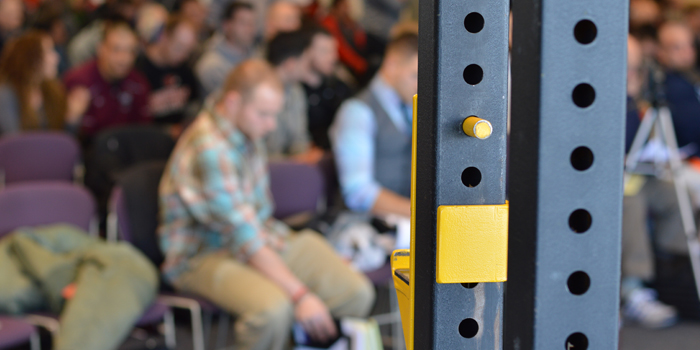
Thanks in large part to social media and other sources, it's possible to know which topics are popular or "trending" and which people may not be worried about or discussing at the time. Unfortunately, unless you're willing to commit gross hash tag abuse, some important topics might never become part of the discussion. Whether people want to acknowledge it or not, there is a topic that is not only worthy of our time but is directly tied to the future we all hope to see.
Although we see it everywhere, the blame game is becoming too prevalent in education and athletics. The lack of responsibility that people are willing to show is frightening, and nothing is being done to change this behavior and increase individual accountability. The majority of failures and shortcomings are being blamed on everyone but the person who fell short, or in this case, everyone but the student or athlete. That isn't to say that every teacher does things perfectly all the time or that every coach makes the right call every time, but there are truly some outstanding people working in the classroom and in athletics who are being forced to spend an unacceptable amount of time ‘under the bus’ because of other people's shortcomings.
I don't claim to understand why this culture shift has taken place, but I do know that if we allow this attitude and the related behaviors to continue, the result will be an entire generation of young people unable to function without an "advocate" holding their hands, making phone calls on their behalf and fighting the battles with teachers and coaches. I understand the desire to protect children at all costs and shield them as best we can from the evils of the world, but eventually they will have to make decisions on their own and handle adversity. We all know that it is difficult to approach unfamiliar situations with confidence, but at some point we are forced to rely on our instincts and training to guide us to the finish line. Far too many are leaving high school or even college without some of the vital skills necessary to survive in the real world.
As before, I believe it is important to provide examples before attempting to figure out possible solutions to the problem:
- A student who shows up, goes through the motions and expects to not only pass the class but achieve a high grade
- A student who, when things don't go as planned, tells his or her parent and the parent then calls/writes/shows up versus the student first approaching the teacher with questions
- A student who is falling short in the class blames the teacher or something about the teacher (some parents are guilty of this as well) instead of anything he or she is doing or, in many cases, not doing
- An athlete who isn't getting what he feels is enough playing time and has his parent ask the coach why
- An athlete assuming that because he showed up in the weight room and/or practice every day that he has earned playing time or even a starting role
This list isn't all inclusive, but in my eyes, these issues are the most common and are worthy of our time in terms of a productive discussion. Let’s address each of the examples, tying the academics and athletics together, and see where we end up.
We'll start with #1 and #5—a student who shows up, goes through the motions and expects to not only pass the class but achieve a high grade and an athlete assuming that because he showed up in the weight room and/or practice every day that he has earned playing time or even a starting role.
This takes place so often that it can become difficult to see anything else happening. A large part of this comes from the old school system of evaluation within academics. It's about earning points rather than any sort of skill development and retention. Show up, complete the task and an acceptable grade will naturally follow. The same goes for the athletic side. I was in the weight room, I did the sprints and I went through the drills so that should lead to playing time and a varsity letter, right?
People want to destroy the common core and anyone who supports it (it isn't a perfect system, but it does have merit). However, the focus that it puts on skill development and mastery is amazing beyond words. Do people really want students who just jumped through the hoops and "earned the ribbons" that come with that? What is the point of honor roll status if the student graduates with honors but lacks key skills like being able to interpret information or speak in front of a group without sounding like a fool?
Flip over to athletics…when did we get to the point where showing up was enough and attitude, effort, work ethic and dedication weren't valuable pieces of the puzzle? Not everyone has the same abilities when they step on the field/court and not every student operates at the same level, but at what point did it become OK to ignore team goals and focus entirely on individual honors and achievements? It feels like we have reached the point where athletes and parents are OK with being bad teammates as long as they walk away with a letter and a patch to put on their jackets. So what if you put such little effort in that you get replaced on the scout team? So what if you throw a tantrum and walk off when a coach challenges you for giving poor effort? So what if you 'train on your own" rather than working with the team in the off-season? As long as you get your trophy, none of those other things (and the amazing life lessons that can come with participation in team sports) matter.
If you are reading this site, odds are I don't have to tell you what a valuable role the weight room plays in athletics, both in terms of individual development and the development of an athlete’s role within the overall team dynamic. This problem of doing just enough and blaming everyone else for coming up short is a constant in the weight room as well. A student who chooses not to push herself and develop a new skill isn't any different than an athlete doing the same sets/reps all the time without giving any attention to her training max or growth within the system that his team is using. It doesn't matter if I'm using the same weight, reps or poor form all the time. At least I'm in here working, right?
We'll turn to #2 and #4 now—the student who, when things don't go as planned, tells his or her parent and the parent then calls/writes/shows up versus the student first approaching the teacher with questions and the athlete who isn't getting what he feels is enough playing time and has his parent ask the coach why.
Many of our children have learned that handling situations appropriately and being assertive doesn't matter. If their grades aren't in order, the teacher who they have a rapport with and speak to every day is suddenly unapproachable. When they aren't getting enough playing time, the coach who has been working with them on the field every day isn't someone they can speak to. If they aren't able to bench press a small car after a short period of time, that strength coach can't possibly have the answers. Before the teacher/coach is even aware of a problem, Supermom is contacting him or her and asking why her child isn't getting the help he needs.
I will never argue against the idea that parents should be the strongest advocates for their children, but what lesson are we teaching that child if someone else is always fighting their battles for them? I realize in some cases that child isn't able to fight and, when questions arise, the adults should work together to both communicate and decide on the best solution. However, this has become the rule rather than the exception, and a vast majority of the time, the parents are leading the charge with little or no participation from the student/athlete. Eventually, these kids are going to graduate, and they will have to deal with people and situations that they don't like (i.e. managers at work, professors in college). It will no longer be acceptable for mom and dad to call or approach them in person. Some kids will be ready for this because their parents made them ask the questions themselves , and some will have no idea what to do…other than to blame others for what went wrong.
Finally, we'll look at #3—a student who is falling short in the class blames the teacher or something about the teacher (some parents are guilty of this as well) instead of anything he or she is doing or, in many cases, not doing.
This last point could surely be tied in with the others, but we can attack it by itself as well. This is happening way too often, and it certainly stretches from the classroom to the athletic and training domains. Students no longer fall short because of anything they have done or, in some cases, haven't done but do so because of the teacher. This applies to coaches as well. Coaches are blamed for picking on the athlete, having a personality conflict, refusing to communicate, being unavailable for questions or additional help and so on.
I have said it before and I will say it again—not every teacher or coach is perfect or makes the right decision every time. However, I know that there are far too many good teachers and coaches who get unfairly lumped in with the few who don't "get it" so to speak. Is it the teacher’s fault that you weren't listening to instructions in class (or when a coach was explaining how to do a drill)? Do we blame the strength coach when you spent two years at an off-site facility and barely squat your own body weight?
What now?
The question now is how do we fix this dynamic? What must we do in order to do what is best for everyone involved?
Communication: We need to ensure that the lines of communication are open and functioning appropriately. In many cases, much like instructing a student or player, communication needs to be individualized or at least segmented to some degree. You can't tell someone to email if they have questions but only check your email from time to time. Everyone needs to understand that there is a time and a place, but when is the last time you heard of all the stakeholders getting together and agreeing on what that time and place was? Newsletters from a teacher and communication from coaches are great things, but if those letters end up in the bottom of a book bag or similar fate, why use them? Emails, text messages and other forms of electronic communication can be powerful tools, but procedures and boundaries need to be understood and followed.
Expectations: Teachers and coaches must find ways to give those they work with realistic expectations and get people to buy-in to those ideas. Most, if not all, football players in Ohio have dreams of running out of the tunnel at The Horseshoe, but reality says for most of them, that isn't going to happen. That is something the head coach must communicate to parents, but it has to be done the right way. Statistics, guest speakers and anything else that sends the message without totally steamrolling someone’s ego (and sadly, many times it is the parents, not the kids, who need a reality check).
In the classroom, the expectations need to focus on value and connections to life after graduation. Not enough of those who need to be reached will have their light bulbs go on when you show them a graph of how much a high school graduate versus a college graduate makes. Just like working in the weight room with players, they need to know where the value is and the connections are. If they are blowing off science class yet have aspirations of a career in which science plays a vital role, that disconnect needs to be pointed out and solved. Otherwise, the gap between the expectations they have and the reality of their situation can't ever be fixed.
Support: In competition, there is a chance on every attempt I make that I will fail. It could be for a whole variety of reasons, but each time I step on to the platform, it could happen. I'm extremely confident in the training and work I've done with my coach leading up to that point, but that doesn't ensure that I will be successful. Unfortunately, in education, not enough people are willing to take this same approach, putting themselves out there knowing there is at least a reasonable possibility that failure will occur. Teachers need to step beyond perceived limits in terms of how they present students with learning opportunities, and students need to be willing to take those opportunities even if the first attempt could have a rough ending. We need to support students and athletes taking chances to better themselves by giving them those "enrichment" opportunities along with the safety net to catch them when they fall. Why can't we take the same approach to athletics as we do with the writing process? We'll give it our best effort. There is a whole team of people supporting you, and although it may take a bit of time, the final product is something we will all be proud of.
Surely, there are other things that we could include here, but I’m especially curious now to see what others think. How do we get everyone on the same team and pulling on the same rope instead of having a battle royal and seeing who or what is left standing? If we can find ways to encourage buy-in to the systems and philosophies and get all parties to take an ownership role, the potential for future teams and learners is so amazing that it's borderline frightening.
Kevin Loadman is a two time graduate of The Ohio State University, holding bachelors degrees in Communications and English Education. He was a member of the football team for 4 years, earning a letter his senior year in addition to training under strength & conditioning coach Dave Kennedy. He has been teaching English at the High School level for the past six years in addition to earning his M.E.d. from Ashland University. Kevin also spent 12 seasons coaching football at the High School level including significant time spent helping with the off-season training programs. He enjoys training and competing in Gene Rychlak's Revolution Powerlifting Syndicate, holding state as well as federation records in the amateur division he currently participates in.









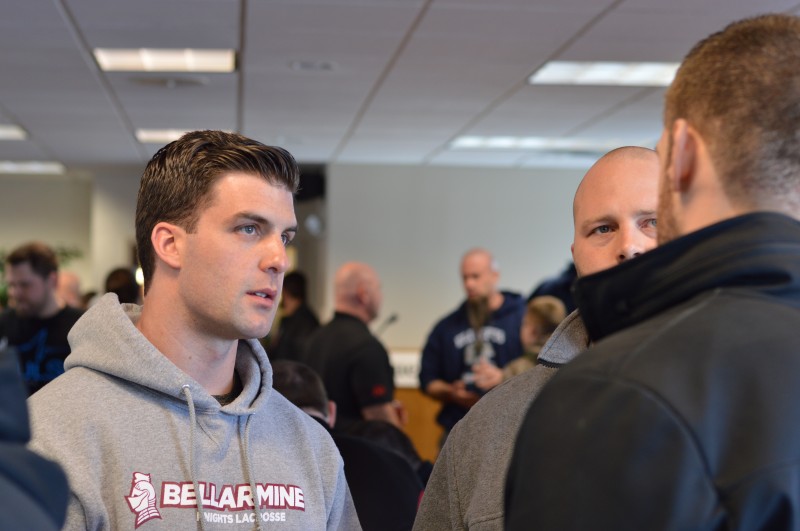
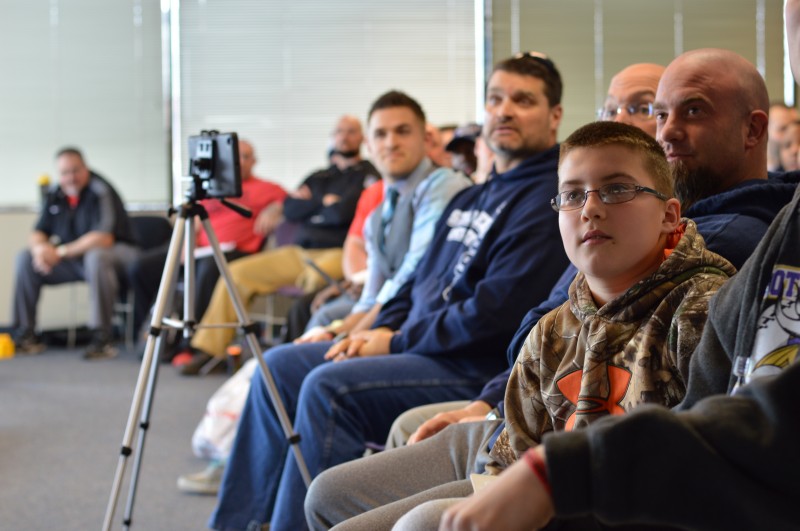
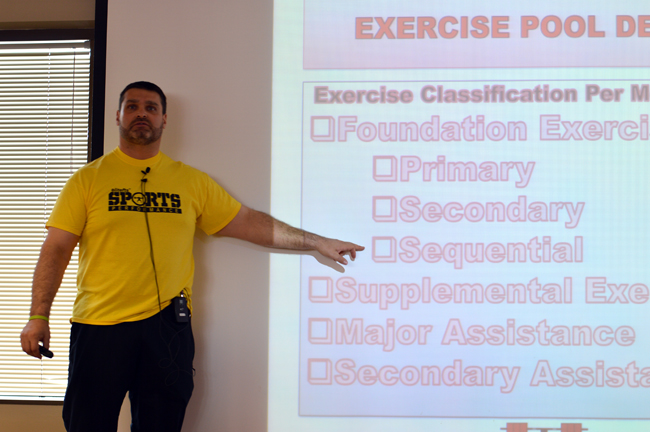
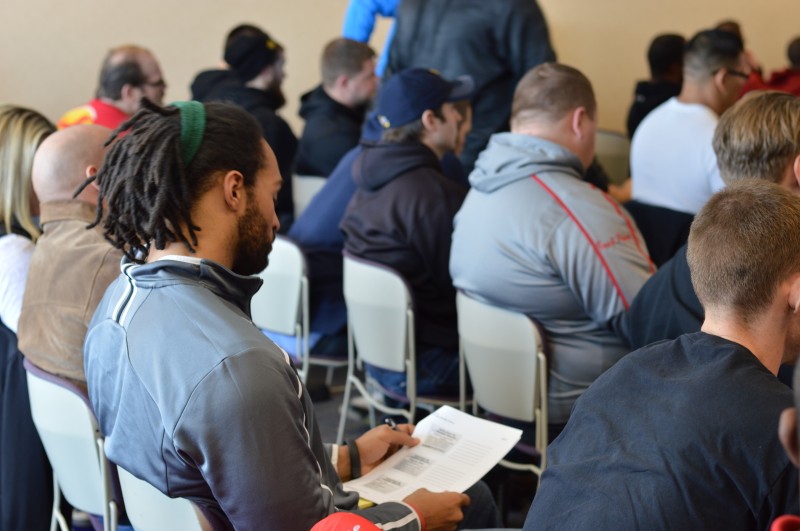
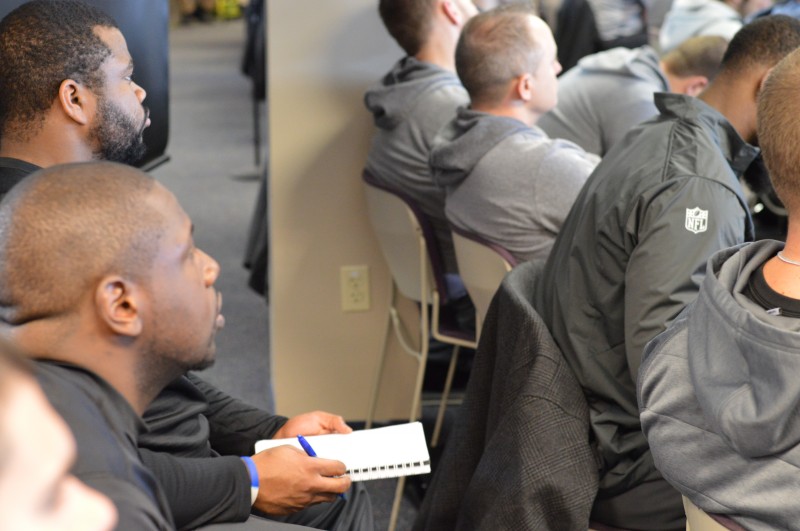
Curious to know what you have done or seen as part of the "re-education" you speak of?